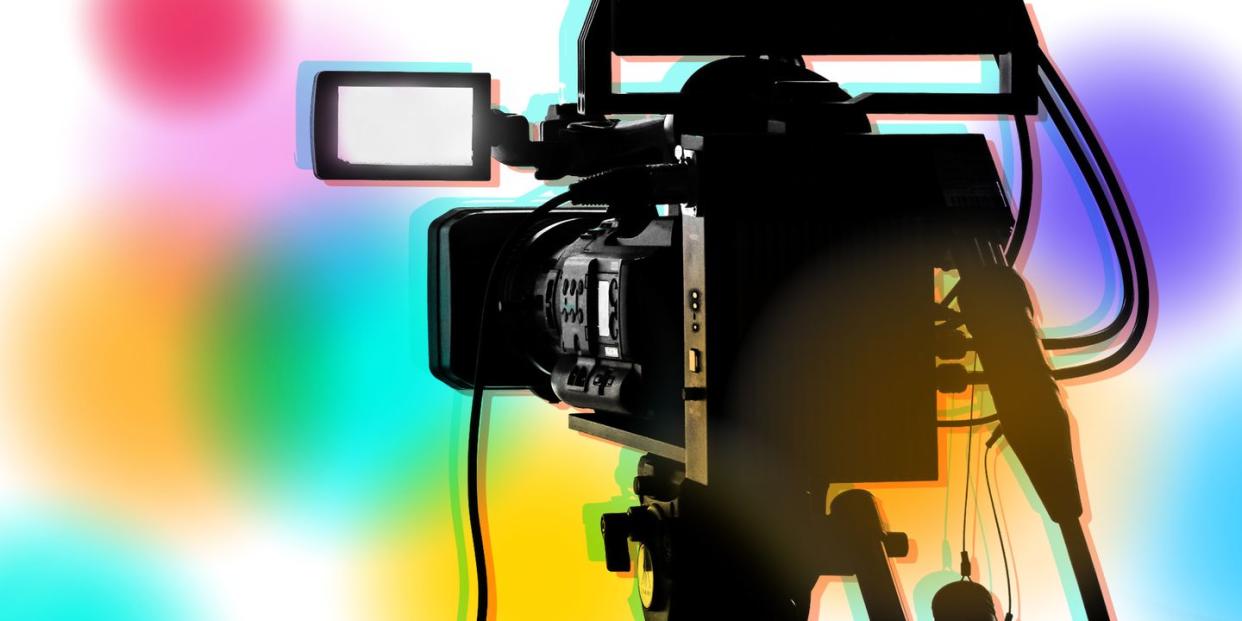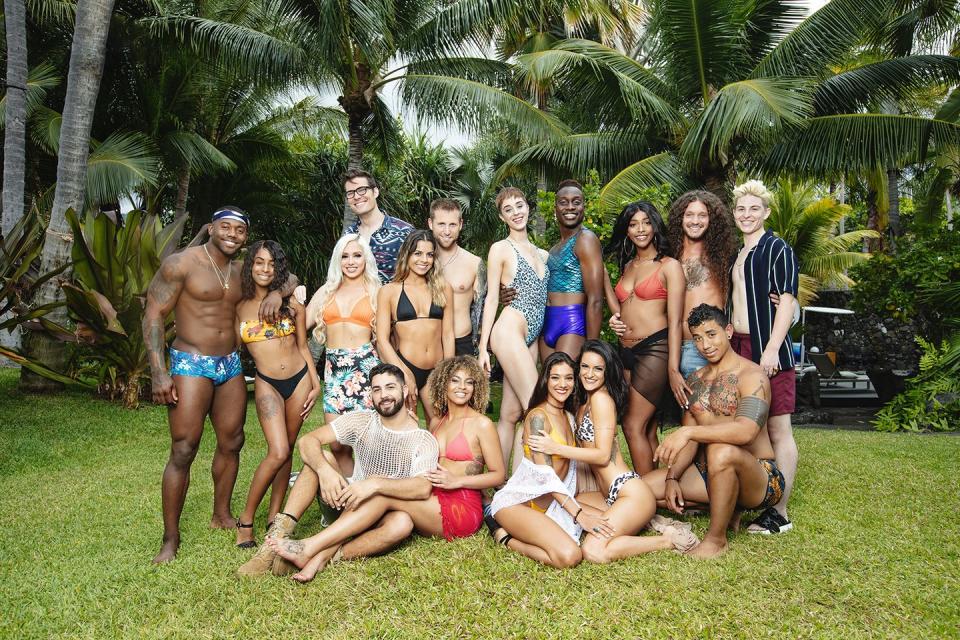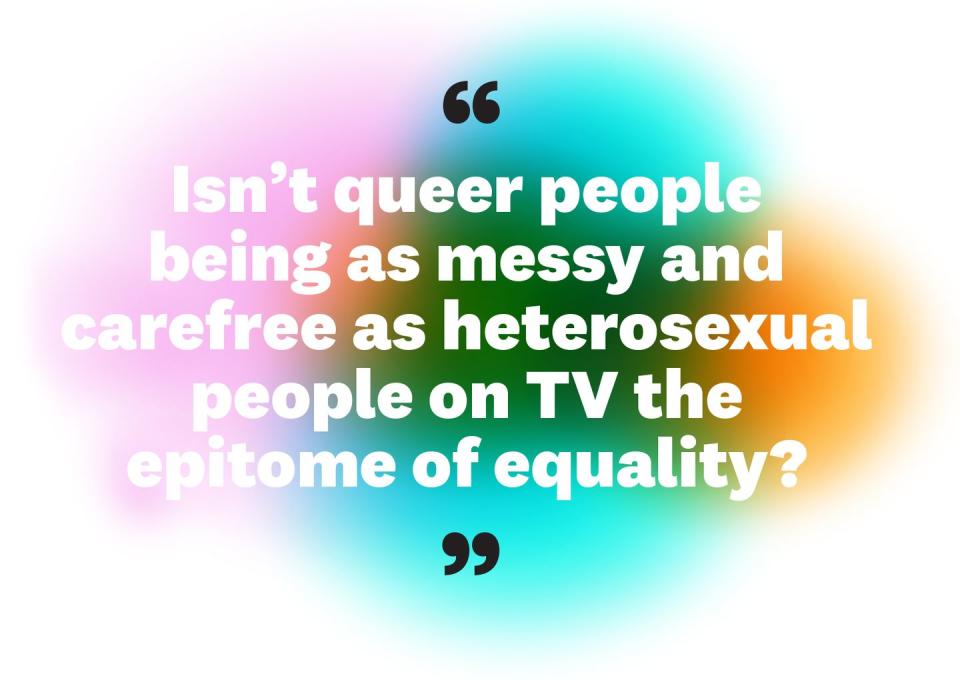Shout It From The Rooftop: It’s Time For More LGBTQ Reality Dating Shows

"This is for the queers!" Are You The One: Come One Come All cast member Jenna Brown said right before the last two beams of light turned on in the Sept. 9, 2019 finale, signaling that the cast of 16 sexually-fluid singles successfully found their perfect matches and won $750,000. It was a historic moment in a historic season of MTV's hit reality dating show.
Before that season, AYTO's premise was typical of reality dating shows: Put 20 heterosexual singles into one house, task them with finding their "perfect match" of the opposite sex to win prize money, watch drama ensue. But its first sexually-fluid season upped the stakes—everyone in the house could be anyone's "perfect match."

Sounds intriguing, right? It was, and it was well done. After premiering during Pride Month 2019, AYTO season eight won the GLAAD Media Award for Outstanding Reality Program in 2020. But, despite being the only season to win any industry awards, there hasn't been another season like it since. Nor—with the exception of Logo's Finding Prince Charming (2016)–has another reality dating show featured only LGBTQ folks looking for love (or at the very least, Instagram followers) in its wake.
Meanwhile, the options for watching cisgender, heterosexual people lust over one another on national television abound, from the decades-long Bachelor franchise to newer fare like Love Is Blind. (And even when a bisexual contestant does make the cut, they're often tokenized or caught on the receiving end of another cast member's biphobia.) It's not as if the premises of these shows are so original that they can only work for straight couples—AYTO proved just the opposite, resulting in an award-winning season of excellent, and entertaining as hell, television.
So, where are all the queer reality dating shows?
When, if ever, will an entity as big and powerful as Bachelor Nation begin to resemble our own? After all, "isn't queer people being as messy and carefree as heterosexual people on TV the epitome of equality?" says Kai Wes, a contestant on AYTO season eight.
It might not be the most pressing question of our time, given the onslaught of anti-trans bills that have passed this year. But, the answer is nonetheless a resounding yes, according to Raina Deerwater, entertainment research & analysis manager at GLAAD: "We say over and over again at GLAAD and in the community that 'representation matters.'" It matters when a film like Moonlight wins an Oscar, Deerwater says. And it matters just as much when all you want to do after a long day is watch people that look like you and love like you participate in silly challenges, have drunken dance parties, and kiss people they probably definitely shouldn't.
Before being cast on AYTO, "the only bisexual representation I ever saw on TV was Tila Tequila, and that was just one person, and it was very gimmicky," says contestant Justin Avery.

That lack of representation isn't unique to reality TV. Only 28 percent of the LGBTQ characters on scripted broadcast, cable, and streaming series in 2020-21 TV season were bisexual+, according to GLAAD's most recent Where We Are TV Report. (Bisexual+ is "an encompassing term for people with the capacity to be attracted to more than one gender. Includes people who identify as bisexual, pansexual, fluid, queer, and more," per GLAAD.)
It wasn't the mere act of representation that made AYTO so exciting and revolutionary—it was the type of representation.
"Queer people got to have the same freedom as straight people…[while] being able to live their full lives and be joyful, without this specter of oppression," says Deerwater. "At the same time, you had people discussing their gender and their sexuality in ways that weren't talking down, but was, in a way, weirdly educational."
It was an education for the cast as much as the audience.
In one episode, for example, cast member Jonathan Monroe misgendered his eventual match, Basit Shittu. "Jonathan is from the South... and he had never talked to anybody non-binary," explains cast member Jasmine Olson, who hails from Mississippi and acknowledges growing up with a similarly narrow understanding of what it meant to be LGBTQ. "So, for Jonathan to open up to Basit and to then watch that relationship [develop], it was just like, 'Damn, we're really learning something.'" Wes adds that they had a long conversation with Monroe after the pronoun incident, explaining to him that "nobody expects anybody to learn [everything] overnight, but as long as you're trying" that's what is important.
Not only did those lessons do double duty when later shown to viewers, but they allowed the audience to identify with a cast member like Jonathan, rather than feeling vilified due to a lack of understanding. "Everybody was accepting [and would say], 'Okay, even if you don't know this, let me show you.' They could have been negative about it, and they weren't," says Olson. "We all came together and realized what we have in common and knew we were doing this for a bigger purpose."
Sans script or schtick, Are You The One season eight got a lot of things right.
Wes, Olson, and Avery all credit MTV and Lighthearted Productions, the production company behind AYTO, with understanding the importance of hiring LGBTQ representation behind the scenes. "Part of what made this season so special and well done was that most of the production was queer in and of themselves," says Wes. "So, they felt really passionately about [the show]."
Being surrounded by crew members who "were a part of our community" made the cast feel "more comfortable talking to people who understand us than we would to a cis, hetero man," adds Olson.
That understanding made all the difference in how the show was produced and edited. For every shouting match and illicit trip to the boom boom room between non-matches (trademark moments of every AYTO season), there was also a conversation about pronoun usage, monogamy, and the different forms a non-binary gender identity can take—topics the show had, perhaps unsurprisingly, never tackled before.
Besides hiring a majority LGBTQ crew, MTV also consulted with GLAAD on best practices to train non-LGBTQ production members. That included speaking with a now-former GLAAD employee who identifies as bisexual and non-binary and "whose personal experience could relate to the show," says Deerwater. "That sort of above and below the line commitment to telling these stories is a huge plus."
The term "safe space" is hardly synonymous with reality TV, but Deerwater says it was a key element to AYTO season eight because "oftentimes a safe space means being surrounded by people who you know won't invalidate a part of you." In doing so, the cast didn't just make each other comfortable, adds Avery, but showed viewers what a world that fully accepted LGBTQ folks and treated them with respect could look like.
It’s not so much the content, but fear of low ratings that often holds networks back from airing LGBTQ reality dating shows.
AYTO season eight had slightly lower ratings than its previous season, but it wasn't catastrophic. Over its 12 episodes in 2019, season eight averaged 741,000 viewers per week, compared to 1,022,000 weekly viewers over 14 episodes in 2018 for season seven, according to Nielsen data. While 200,000-ish viewers might seem like a gap too large to bridge between seasons, there were moments of similarity: In one week, for example, the ratings for both were above 900,000 viewers.
"Even though it's been proven wrong again and again, a lot of these older executives and industries have biases about 'ratings.' …There's this sort of lingering stigma that anything outside of the box is a 'risk,'" says Deerwater. "I think it's just a matter of convincing the decision makers that people want to not just see themselves represented in one season of a reality TV show; they want to have a show they can tune into every season that is about them. Just look at how well Drag Race is doing."
Progress is being made with episodic reality dating shows, like Netflix's Dating Around and E!'s Dating #NoFilter, which show LGBTQ singles navigating the early stages of dating alongside heterosexual ones. But "it takes a lot for someone who has been in this industry for decades and has had that association that queer people equals 'risk' to unlearn that," admits Deerwater. To help move the entertainment industry forward, GLAAD meets with studios and networks and share all the facts proving LGBTQ films and television shows have done well and will continue to do well.
She considers "Are You The One a perfect case study of this," despite its less-than-stellar ratings, because "ratings can be accrued over time and also there's something to be said about social media." (Twitter was buzzing in 2019, trust me.) She adds that, often, "people use ratings as an excuse to not air something," but "having trust in the popularity of something and how an audience can grow over time is really important."
The future of Are You The One is uncertain, but the future of queer dating shows shouldn't be.
Here's where things get complicated: Production on AYTO season nine had started, but then, Lighthearted Productions hit pause amid allegations from former season five cast member Gianna Hammer, who told The Daily Beast that she was "drugged" by the production team and sexually assaulted by a fellow cast member on the same night.
It's unclear whether the show will resume filming in the future, and Women's Health has learned that MTV has yet to make a decision on whether season nine would have a sexually-fluid cast. The publication also reached out to Lighthearted Productions for comment.
But just because AYTO was the first reality show to feature a sexually-fluid cast doesn't mean it needs to be the only one. On the contrary, "what the [entertainment] industry has to overcome is that while a first is important, it's equally important to have a second and a third," says Deerwater.
For that second or third (or, hopefully, more) show to succeed, they can learn a lot from AYTO: Replicate the good, ditch the bad, push the envelope even further.
"In a perfect world, I'd love to see all of my favorite [reality] shows remade as queer. Because why can't we have the same thing?" says Wes. "…But, from a more realistic standpoint, I think we need more than one queer dating show because I don't think one format is the only way to do it, because there's not only one way to date, right? In addition, we need multiple seasons—no matter what."
Having multiple seasons of multiple shows will help other reality dating shows avoid having to be "all things to all LGBTQ people," or making a cast of 16 individuals the single example that represents an entire community.
Deerwater thinks the next reality dating show could do a better job of casting multiple people who are trans and non-binary. "Trans storytelling hasn't reached the point that LGB storytelling has... There is so much joy in the lives of trans people that aren't just transition stories or tragic stories," she says. "...The most vulnerable group within us is Black trans women, and to give a fun dating reality show to Black trans women would be amazing."
The time is ripe for a new generation of reality shows that explore sexuality and gender outside the cis-hetero norm.
Nearly one in six members of Gen Z (15.9 percent) said they were queer or transgender, per a new Gallup poll. "There is such a huge audience for queer reality TV in general, and there's such a huge audience for dating reality TV… to combine them would just make sense," explains Deerwater.
While the future of AYTO remains uncertain, there's one thing Wes knows for sure: "If MTV doesn't do the next big queer dating show, somebody else is going to beat them to the punch."
Avery agrees: "Whether it's Are You The One sometime in the future or another show, I know that we'll definitely have some sexually-fluid cast members to come on some trashy reality TV shows soon."
The best way to make that happen? Watch the shows with LGBTQ characters and cast members that already exist—as they air, if possible, says Deerwater.
She also emphasizes the importance about posting about these shows on social media. "Reality TV, especially, can become an event if enough people are talking about it online," Deerwater says. "...We see it with Drag Race, Queer Eye, and so many other reality shows."
So if you're a fan of LGBTQ-inclusive shows, watch them, and then shout about it from the digital rooftops.
You Might Also Like